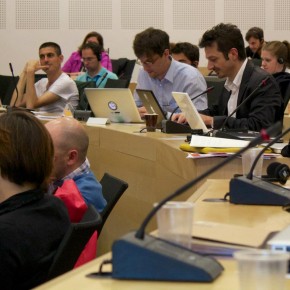
The Edgeryders distributed think tank is entering a new phase: the validation phase, or building on top of a great amount of data that’s been generated since the launch of our platform. The stories we’ve shared and our interactions - social, peer-to-peer and rewarding learning experiences as they feel - are part of an overriding research goal: to enable us to better inform policy initiatives around youth transition. We’d like to try to make sense of it all, as a community and with the help of a small research team; the team has been reading, analysing and placing Edgeryders material in contexts that the policy world, including institutions, can make sense of - i.e in the form of policy research papers, each addressing a specific theme. The idea is to use the papers as a starting point for an open and collaborative writing process, because as a community we can produce something much better than anything 10 experts in a room can put together. After the validation process is done, Rebecca Collins will then synthesize the main points from the papers, and the community discussions around them into a first version of the transition handbook. The handbook aims to leverage Edgeryders’ collective wisdom to the point where it makes an impact in the policy community, by speaking to individuals in institutions charged with addressing specific issues. The document should also speak directly to young people and other Edgeryders, using key terminology as used by Edgeryders themselves. For a detailed overview of background, process and your role in building the handbook, as well as tentative structure and production timeline go to this doc. Want to help Make sense of Edgeryders experiences? Start by checking out the summary of Rebecca’s and Valentina’s ethnographic report:
Both real and virtual networks constitute a fundamental structure of support for Edgeryders: they provide an arsenal of inspiration, motivation, skills, guidance and mentoring, emotional support, and they are channels where individual projects can take off, through understanding of reciprocity, and the reputational mechanism. For some Edgeryders, peer networks are taking on characteristics associated with families. The latter are indeed the cornerstone of support, emotionally, but also financially. The policy-relevant implication here is: who else should be bearing some of the risks – and enjoying some of the rewards – of Edgeryders initiatives? read more
Do you recognize yourself in the description? Are there questions or issues you feel should be included? Any questions of your own you would like help in getting answered? Please leave comments either below the summary post or directly on to this google doc [full report].